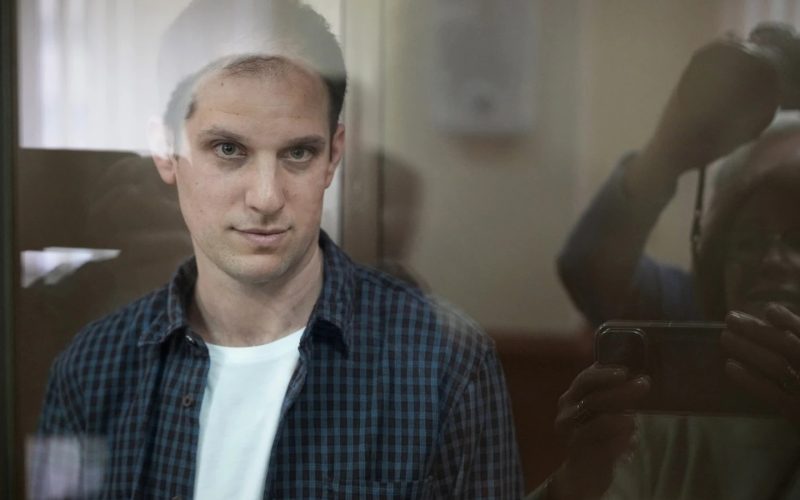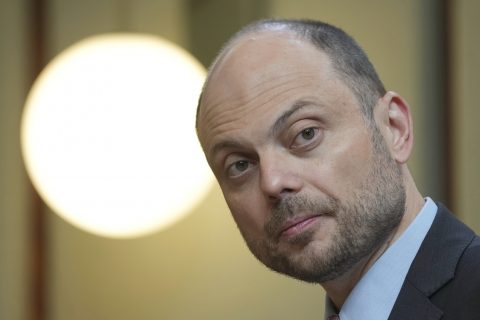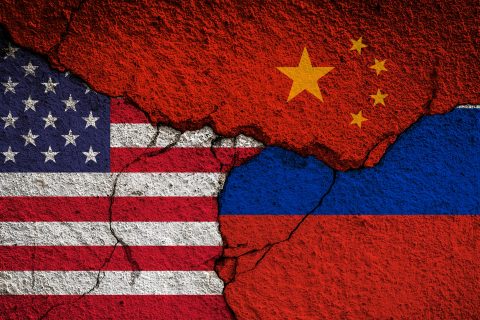One year ago, Wall Street Journal reporter Evan Gershkovich was imprisoned by Russian authorities and charged with espionage. Wall Street Journal assistant editor Paul Beckett joins host Krys Boyd to discuss what is known about Gershkovich’s condition in prison, the efforts to free him, and what journalism looks like in Putin’s Russia now.
Russia’s motives behind the arrest of Evan Gershkovich
By Shaunessy Renker, Think intern
This week marks one year since Wall Street Journal foreign correspondent Evan Gershkovich was detained in Yekaterinburg, Russia on charges of espionage.
Gershkovich was born and raised in the U.S. and is, as his mother likes to call him, an all-American boy. But growing up, his parents raised him with Russian traditions, culture, holidays and the Russian language.
Paul Beckett, assistant editor at The Wall Street Journal, says that Evan realized he wanted to become a journalist while working at The New York Times as part of a reporting assistantship. During that time, his editor encouraged Evan to become a foreign correspondent in Russia given his advantageous upbringing.
“Evan had been fascinated by his heritage,” says Beckett. “So, he used his life experience to dedicate himself to covering Russia and to find out more about Russian culture, people, and Russian government.”
According to Beckett, Gershkovich was accredited by the Russian government to work there as a foreign correspondent which means he had permission to move there, work in the country, and report back to his news organization.
“As I’ve read more of his work, what really comes across is he loved being in Russia,” says Beckett. “He wanted to get to know Russia from the ground up and he immersed himself in Russian life.”
For one of his most moving stories, Evan went to a site where corpses of Russian troops were returned from Ukraine and given to their families. His reporting of this sobering visit gave insight into the casualties of war, regardless of which side. Beckett says he had read no other story like it—one that dove into the emotional toll the war takes on families whose children were sent to the frontlines.
“Traditionally, if you run afoul of the authorities for whatever reason, the standard procedure has been if they don’t like what you’re doing, they kick you out [of the country],” says Beckett. “That’s why this is all the more surprising…it wasn’t about what he [Gershkovich] was doing, it was an opportunity for Russia to gain some leverage over the United States, so they grabbed him.”
This isn’t the first time we’ve seen Russia effectively collect people to trade. Paul Whelan, security director for BorgWarner, was arrested in Moscow in 2018 and Brittney Griner, a professional basketball player in the WNBA, was arrested in February of 2022 at a Moscow airport. So, it’s not about what Evan Gershkovich reported, but rather about what he symbolizes.
Beckett says that when it comes to taking journalists hostage, there is an added benefit in the eyes of the Russians. News of Gershkovich’s arrest prompted a withdrawal of nearly every western reporter from Russia, particularly by the American Press Corp. The result of that is for the past year, we’ve been deprived of reliable news about Russia, insight that we depend on to better understand the war. Beckett thinks that is exactly how the Kremlin wants it.
“It’s hard to imagine a country that has a greater sway over American life and government decisions at the moment than Russia,” says Beckett. “We’re in one of those times where understanding what’s happening in Russia is so vital…and yet that’s what we’re deprived of and you wind up with Russian state propaganda.”





